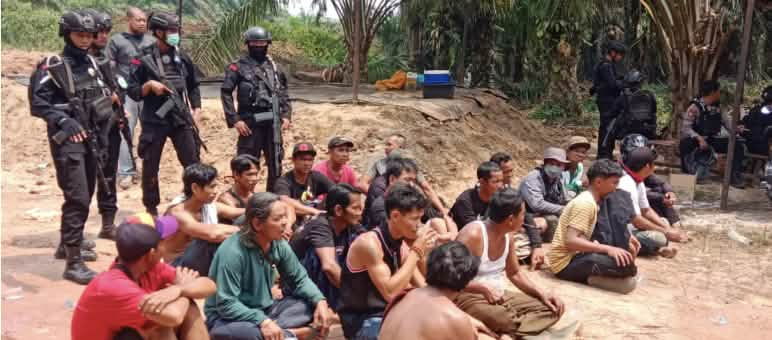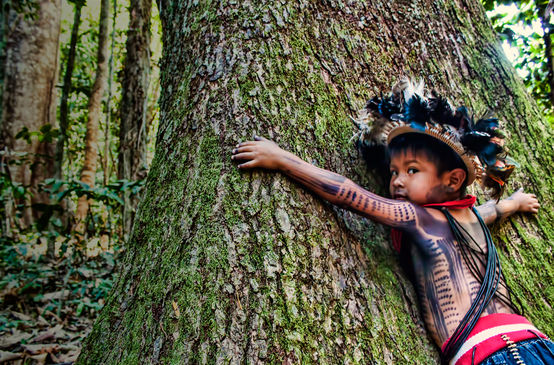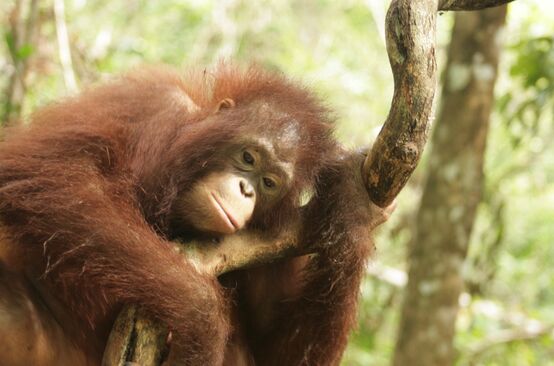
Indonesia: Protesters killed and injured on oil palm plantation in Bangkal, Borneo
On October 7, Indonesian police guarding oil palm plantations in Borneo opened fire on protesting Indigenous people. The aftermath: one dead, two seriously injured and twenty arrests. The scene of the crime is a plantation of the Best Group near the village of Bangkal.
On Saturday, October 7, 2023, an Indigenous man was shot dead and two others were seriously injured at an oil palm plantation in Borneo.
Since September 16, residents of the village of Bangkal have been protesting land grabbing and injustice at the PT Hamparan Masawit Bangun Persada (HMBP) plantation. HMBP is owned by Best Agro International, one of Indonesia’s largest palm oil companies and a division of the very wealthy Tjajadi family’s Best Group.
The villagers accuse the plantation company of planting more than 1,000 hectares of oil palm outside the concession area. Since 2013, they have been demanding that this land, as well as 1,175 hectares of rainforest inside the concession area, be returned to them. But the company has stalled for ten years. It has refused to talk, prompting the people of Bangkal to block access roads to the plantation starting in mid-September 2023.
Instead of working to resolve the land conflict, the administration of Seruyan district in the province of Central Kalimantan has sided with the company. Police units moved in to disperse the protest with tear gas and live ammunition. Protesters recorded the events on their phones.
The shots hit three men. One of them died on Saturday and the other two were seriously injured. Twenty Bangkal villagers were arrested. They were released on Sunday evening after nationwide protests over police brutality against Indigenous people who are desperately fighting for their rights.
Conflicts over land have become commonplace in Borneo as a result of wholesale deforestation to make way for huge plantations. With the loss of forest and land, local communities are being deprived of their livelihoods. Instead, over the past fifteen years, millions of hectares of oil palm plantations have been spreading across Borneo, initially to meet European demand for biofuels.
Communities that stand up for their rights can face a brutal response. The Indigenous people of Borneo, the Dayak, are victims of palm oil-based economic growth.
“The police,” an Indonesian journalist tells us, “shoot at people instead of protecting them.”
According to the environmental organization WALHI (Friends of the Earth Indonesia), the current demonstration of anger by the people of Bangkal also stems from frustration with the government, which prioritizes business interests and powerful corporations over the rights of ordinary citizens and never works to resolve land conflicts.
In light of the violence, our local partner organization Save Our Borneo is calling on the UN Commission on Human Rights to investigate the conflict.
“The security forces must prevent violence and ensure fair and equal dialogue,” Save Our Borneo, Sawit Watch and Satya Bumi said in a joint press release.
Save Our Borneo has been calling attention to HMBP’s land grabs, illegal logging and violations of the law for years – an arduous and rarely successful effort. In 2022, we celebrated the success of a lawsuit by a Mr. Hiden from the neighboring village of Penyang for the return of a mere 15 hectares of forest. It was not to last, however, as HMBP won the appeal in 2023.
“Borneo is in the clutches of corporations,” says Safrudin from YIHU (Foundation for People and Rainforest). “The forest is being destroyed and the people are being left behind.”
Rainforest Rescue stands in solidarity with the dead, the injured, the people of Bangkal, and all people who are victims of rainforest destruction and greed for land. We send our sympathy and condolences to the families.
Police violence and shootings show the lack of respect for the human rights of Indigenous peoples. They also show that the consumption of more and more palm oil – and other resources – is leading to ever-increasing casualties.
We are still working to determine whether palm oil from Best Group finds its way into our markets through refineries and wholesalers. The sheer size of the Group suggests that the likelihood is high.
This page is available in the following languages:

Supporting rainforest defenders
Rainforests are in particularly good shape wherever Indigenous people live and local communities are committed to conservation.

NO to “Food Estates” in the peat forests of Borneo!
The vast peat bog forests of Borneo could soon be destroyed for industrial rice farms. Nearly 200 Indonesian NGOs and conservationists are saying NO! to the plan.

Palm oil
Palm oil is literally everywhere – in our foods, cosmetics, cleaning products and fuels. How could it come to this?